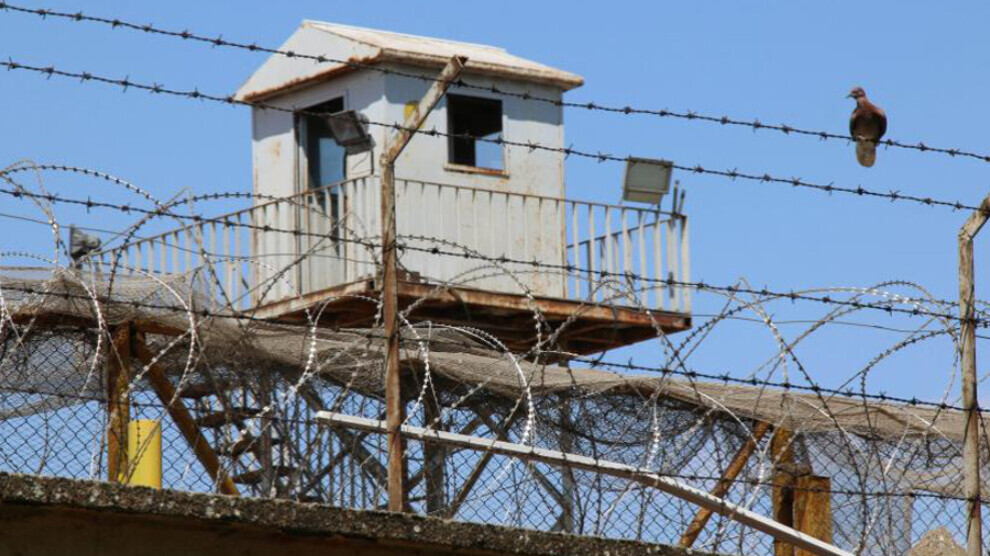Human rights violations in Turkish prisons in 2024
MED TUHAD-FED and ÖHD published a report detailing the human rights violations recorded in 91 Turkish prisons in 2024.
MED TUHAD-FED and ÖHD published a report detailing the human rights violations recorded in 91 Turkish prisons in 2024.

The Federation of Legal Aid and Solidarity Associations for Families of Prisoners (MED TUHAD-FED) and the Association of Lawyers for Freedom (ÖHD) have published a joint report in which they documented serious human rights violations in Turkish prisons in 2024. The report is based on interviews with prisoners in more than ninety prisons.
Illegal, inhumane and arbitrary practices
The report lists a number of examples of the living conditions and illegal, inhumane and arbitrary practices to which prisoners are exposed behind Turkish prison walls. These include physical abuse by prison staff, body searches and a ban on the Kurdish language. In addition, there are poor hygienic conditions; prisoners rarely receive cleaning products and have to buy them from prison canteens at exorbitant prices, while tap water is often contaminated and undrinkable.
To make matters worse, there are massive restrictions on the right to information. According to the report, prisoners are arbitrarily denied access to magazines and newspapers. In particular, it is virtually impossible to obtain a copy of the pro-Kurdish newspaper "Yeni Yaşam", and the maximum number of books has been reduced. This severely restricts the right to obtain information and access to the media, as well as contact with the outside world.
In addition, cultural, sporting and artistic activities that were suspended during the COVID-19 pandemic have not been resumed.
Another focus of the report is the obstruction of access to medical treatment. When prisoners are transferred from prisons to hospitals, so-called oral cavity searches are carried out, while prisoners are moved with their hands handcuffed behind the back. Anyone who refuses these measures is not taken to hospital at all, which endangers the treatment of seriously ill prisoners. Transfers to clinics outside the prison often take place without prior notification and lead to naked searches en route. Ill prisoners are not released, which, according to the report, is a violation of their right to health and life.
Censorship targets Kurdish language
The report also underlined that there is "comprehensive censorship targeting the Kurdish language" in prisons. Examples of this include the confiscation of Kurdish books and letters written in Kurdish, as well as disciplinary punishments for singing Kurdish songs. Prisoners who greet each other in their native language are subjected to verbal and physical attacks. The right to one's native language is a fundamental human right and, as such, has been enshrined in all relevant international agreements.
Release refused or delayed
The authors of the report also criticize the refusal or the delay in the release of prisoners, often for “lack of remorse”. In Turkey, the monitoring committees of the different prisons decide on prison releases. These committees are made up of employees who have no legal expertise but can nevertheless decide on measures involving deprivation of liberty. The common questions they ask prisoners to make their decisions are "Do you think the PKK is a terrorist organization?" and "What do you think of Abdullah Öcalan?" If the answers are not satisfactory, prison releases are postponed.
Requests and recommendations
MED TUHAD-FED and ÖHD called on both national and international institutions, including the Ministry of Health and the Ministry of Justice and the European Committee for the Prevention of Torture (CPT), to take urgent action. They said that inhumane practices such as naked searches, isolation and handcuffs must be stopped, certain types of prisons must be closed, and independent control mechanisms must be set up in order to effectively combat the abuses and guarantee the rights of prisoners.
The organizations also name a series of measures that are necessary to end the abuses covered in the report:
-Ending illegal acts
All practices and acts that violate the prohibition of torture and ill-treatment, access to medical treatment, personal freedom and security, freedom of communication and expression and the right to private life must be stopped immediately. The responsible authorities should fulfill their positive obligations.
-Abolition of certain types of prison
Y and S-type prisons must be closed; other detention facilities must be adapted to the principles of human dignity and human rights.
-Immediate abandonment of degrading measures
Strip searches, oral cavity searches, military roll calls while standing and solitary confinement must be stopped. Handcuffs during medical examinations or while travelling in a transport vehicle must also be abolished.
-Legal reforms to prevent new violations
Taking into account the rulings by the Constitutional Court and the European Court of Human Rights, permanent regulations should be put in place to prevent future violations of the law in the case of transfers, disciplinary punishments and the right to communication.
-Repeal of administrative regulations to the detriment of prisoners
The committee regulations and the “Regulation on the Assessment of Convicted Persons” should be abolished so that conditional release is no longer prevented.
-Fair assessment of “good conduct”
Before criteria for possible “good conduct” are established, prison conditions must be assessed fairly and the facilities designed to be humane.
Elimination of the “enemy criminal law”
Anyone who has been imprisoned under discriminatory laws such as the “anti-terror law” should not be considered a “criminal who needs to be rehabilitated”. Prison and criminal laws as well as the judiciary must move away from the approach of enemy criminal law.
-Independent control mechanisms
In particular, the situation of seriously ill prisoners and other serious human rights violations, torture and repressive measures must be monitored by national and international, independent supervisory bodies.
-Active intervention by the responsible authorities
The European Committee for the Prevention of Torture (CPT), the Ministry of Health and the Ministry of Justice, the Institution for Human Rights and Equality of Turkey (TİHEK) and the Human Rights Commission of the Turkish Parliament must not ignore the human rights violations in prisons, but must take urgent action.